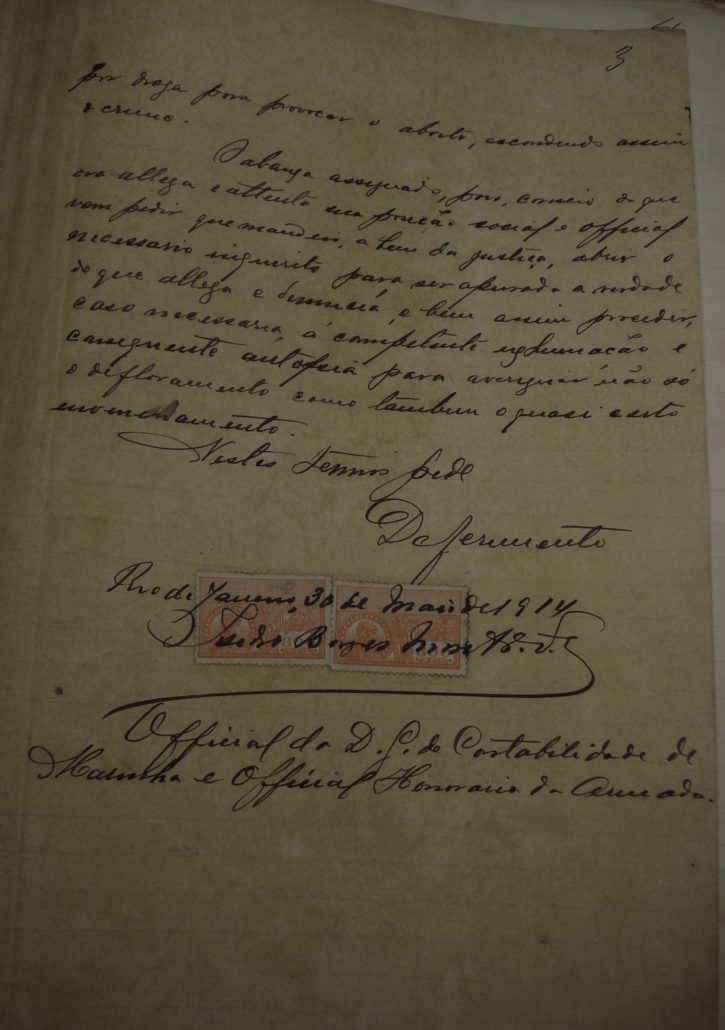He Said, She Said: Abortion Denunciations and Male Power in Turn-of-the-Century Rio de Janeiro
by Dr. Cassia Roth
Historians have demonstrated that gossip and denunciation demarcate the moral boundaries of any given society.[1] Early-twentieth century Brazilian society judged a woman’s honor based on her virginity or chastity outside of marriage and her fidelity within it.[2] In this context, abortion denunciations represented the consolidation and circulation of ideas on proper female sexuality. The public imagination associated abortion with clandestine sex, and gossip solidified these social values in the public sphere. Scholars of fertility control in Brazil have argued that abortion rumors controlled women’s behavior by casting doubt on their sexual honor and public reputation.[3] But “idle talk” around abortion also attacked men’s individual patriarchal authority. Husbands and fathers perceived rumors surrounding their female family members’ sexual life as assaults on their patriarchy. Nonetheless, scholarship has not focused on the role men played in facilitating gossip about female sexuality.
My research remedies this gap by analyzing police investigations and court cases involving denunciations of and gossip about abortion. In doing so, I reveal men’s involvement in abortion gossip and denunciations in early-twentieth-century Rio de Janeiro, Brazil. Women were not the only ones who had to “defend their honor” in response to reproductive-related rumor.[4] Female sexual independence—evidenced through the clandestine practice of fertility control—also threatened male figures.[5] I argue that men employed denunciations of abortion to defend their social standing and authority in both the public and private spheres. Fathers denounced deflowerers who took their daughters’ virginity and husbands denounced midwives who performed abortions on their wives.
These denunciations were also a response to political change. In the early-twentieth century, the Brazilian state co-opted the power that many men had previously held over their families. As women’s sexual honor moved from the jurisdiction of the family to that of the state, the female-controlled practice of abortion threatened men’s already-eroding familial patriarchal power. Thus, men denounced the people who facilitated women’s access to abortions in an attempt to reassert their authority over their families. Ironically, men’s efforts to defend their individual power through condemning female sexual independence actually transferred patriarchal control to a modernizing state. Men relied on the state—here the police and judicial system—to hear and respond to their claims, giving it the power to control and castigate women’s sexual independence. On the surface, men’s denunciations of outside threats to their female family members’ sexual honor seemed to support individual patriarchy. In reality, however, they facilitated the state’s expansion into the private lives of all those involved.[6]
Early-twentieth-century Rio de Janeiro was Brazil’s political, economic, and cultural center during the liberal First Republic (from 1889 to 1930). As the country’s capital, the city experienced issues related to Brazil’s newfound democracy, revised criminal laws, and demographic changes. First, the abolition of slavery in 1888 and the fall of the Brazilian monarchy in 1889 ushered in the country’s first democratic government. Despite these drastic changes, Brazil’s new government limited civil participation in public life through, for instance, voting restrictions based on literacy and gender.[7] Despite these constraints, post-abolition Brazil still conveyed the promise of increased mobility and access to political and economic power through the implementation of wage labor and the adoption of symbolic democratic principles. And so, while the state worked to restrict citizenship based on race, class, and gender, ordinary Brazilians fought to gain access to its perceived privileges. Gossip and denunciation was one manner through which the lower and working classes asserted authority in the public sphere and gained recognition from the state. It was during this period of changing social, political, and economic mores that the Brazilian state began to co-opt family-based patriarchal norms. After coming to power in 1930, Getúlio Vargas increasingly took on a populist mantle, expanding social and economic rights in exchange for popular support.[8] Protective labor legislation for women and children and political reforms such as women’s suffrage (for literate women over the age of twenty-one) were coupled with expanded state control over its citizens.[9] By the time Vargas dissolved parliament and instated his corporatist dictatorship in 1937 (the Estado Novo, 1937-1945), the state had successfully appropriated the nineteenth-century familial model of patriarchy.[10] Vargas reinforced the importance of the bourgeois family, making the state a metaphor for the nuclear families at its core.[11] Fathers and husbands no longer had singular authority over their female family members. Rather, Vargas, as the “father of the nation,” bestowed both privileges and punishment for gendered indiscretions.
Second, Republican Brazil updated its legal system when it implemented democratic rule. Rio de Janeiro was the country’s center of judicial decision-making, and legal trends within its jurisdiction set precedent for practices across Brazil. In relation to abortion, the passage of the 1890 Penal Code (in effect until 1940) expanded definitions of criminal responsibility and implemented harsher sentencing practices than the previous 1830 Criminal Code. Most importantly, it also expanded a woman’s legal responsibility in relation to abortion. While the previous 1830 Criminal Code only criminalized the abortion provider, the 1890 Code punished both unlicensed and licensed providers (Articles 300§1, §2; Article 301) and the pregnant woman (Article 301§1). However, the sentence was reduced if the woman sought to “hide her dishonor.”[12] A woman who did not adhere to gendered sexual standards should be punished. But if she practiced abortion or infanticide to maintain her honor, her intention needed to be taken into account.
Third, the city of Rio de Janeiro went through drastic demographic changes due to the early-twentieth-century processes of urbanization, immigration, and industrialization. Rio’s population growth doubled between 1872 and 1890 (when it reached over 500,000). It tripled by 1920 with over one million habitants. By 1940, the population had reached nearly 1.8 million people.[13] Contributing to this growth was immigration and migration. Immediately after abolition in 1888, large numbers of ex-slaves migrated to the Capital, while immigrants arrived from Italy, Portugal, and Spain.[14] This increased urbanization of and immigration to the city led to changing sexual practices, rising urban poverty, high numbers of non-married individuals, and an increased number of people—particularly women—in low-paying or non-permanent jobs.[15]
It was during these tumultuous changes that individual men struggled to maintain a hold on a patriarchal structure in their families, while the state was actively working to implement patriarchy from the top-down. Denunciations of abortion providers or facilitators were one manner in which fathers often defended family honor in the face of perceived threats to their status as patriarchs.[16] For example, in 1914 the Navy official Isidro Borges sent a letter to the deputy police chief. In it, he denounced his ex-wife’s common-law husband (amasiado) for causing the death of his daughter Judith.[17] Judith and her common-law stepfather had allegedly been having an affair, which had left Judith pregnant. Soon after, she died suddenly from a uterine hemorrhage, and it was “the version in the neighborhood” that Judith’s stepfather (and lover) had forced Judith to take an abortifacient, which had killed her. Judith’s father Isidro was surprised with the news of his daughter’s death. He quickly sent a letter to the police in which he stated that Judith had been deflowered by her stepfather who then forced her to have an abortion. Invoking his role as the worried father and patriarch, Isidro asked the police investigate the deflowering and death of his daughter.
Various witnesses supported Isidro’s version of events, relaying the “boatos e versões” [rumors and gossip] that had flowed freely through the community. Regardless of his concerned letter, it seems that Isidro had not been the protective father he invoked in his denunciation. Judith’s parents had never been officially married, although Isidro deftly noted in his letter that both of his daughters’ births were officially registered (and thus his name appeared on the birth certificates). In fact, Judith’s mother testified that Isidro had abandoned her and her daughters, forcing her to find another man to become the family’s breadwinner. The death of Judith, then, made Isidro’s inability to fulfill his role as the family patriarch even more glaring. One, Isidro had failed to defend his daughter’s sexual honor. Remember, she had allegedly been deflowered by her common-law stepfather, Isidro’s stand-in. Two, he could not save her life as her efforts to hide her extra-marital sexual relations resulted in Judith’s death. Nevertheless, Isidro’s patriarchal failures did not stop the police from taking Isidro’s petition seriously and investigating the death. In fact, perhaps the police—as agents of the state—viewed Isidro’s lack of fatherly authority as an opportunity for the state to assume patriarchal control.
Husbands also employed abortion denunciations to gain control over their wives’ independent decisions to terminate a pregnancy. These denunciations were most often levied at the midwives who provoked the abortions, and not at their own wives. The fact that these men had to publicly denounce other women to control their wives demonstrated that they had little practical power over their wives’ decisions.[18] For example, in 1929 Avelino Lopes brought a formal complaint against the midwife Bertha Vieira.[19] Avelino stated that Bertha Vieira had performed an abortion on his common-law wife (amasia) Rosa without his knowledge. After the procedure, Rosa became sick and she admitted to her husband that she had sought out an abortion without his knowledge. Rosa had relied on female neighbors to both provide the information on where to seek out an abortion and to bury the aborted fetus. Only the consequent infection alerted her husband to her actions. Rosa eventually died during the course of the investigation from an abdominal infection. But even when Rosa was alive, both Avelino and the police placed the blame on the midwife as the woman who had influenced Rosa to seek out an abortion and then ultimately killed her. To these men, Rosa’s desire to terminate a pregnancy was not innate but rather influenced by outside forces.
Husbands’ focus on abortion providers both reflected and contributed to the legal sentencing trends surrounding the practice of abortion. Under the 1890 Brazilian Penal Code (in effect until 1940), the legal system was more likely to prosecute the abortion provider than the woman, even though both could be brought to trial for the crime.[20] Prosecutors and judges did not hold women responsible because the law viewed them as irrational actors who made the decision to have an abortion in a hysterical state. While this trend allowed women to escape from criminal charges, it also cemented the notion that no woman “in her right mind” would get an abortion. Legal jurisprudence tied sexual activity to reproduction and motherhood. The courts believed no rational woman would reject motherhood. Although this tendency meant that women in abortion trials could defy gender norms by escaping punishment for abortion, it simultaneously restricted their agency by reinforcing hegemonic ideas about motherhood and patriarchy.
In the end, the practice of abortion threatened men’s patriarchal control, while protecting a woman’s sexual honor upheld men’s own social positions. Denouncing abortion attacked visible demonstrations of female power. Thus, men often attempted to assert control in situations where their wives or daughters had an abortion by denouncing third parties. In doing so, however, men relied on a state intent on consolidating its own version of patriarchy. Men’s individual attempts to reinforce patriarchy actually facilitated state cooptation. Feminist theory has demonstrated that abortion threatens dominant notions of patriarchal control.[21] In early-twentieth-century Brazil, abortion could mean sexual freedom, independence from one’s husband, and more economic autonomy. In effect, abortion allowed women to break from their prescribed roles as wife and mother. As such, it directly attacked the entire gendered system of honor that reinforced patriarchal norms. Their ability to have abortions demonstrates that while both men and the state hoped to consolidate patriarchy, women continued to defy their attempts.
Cassia Roth holds a PhD in Latin American History from UCLA and was the recipient of a 2016 CSW Travel Grant, which supported her trip to the UK to present this research at the Transnationalism, Justice, and the Arts Research Group at the University of Durham.
[1] Lauren Derby, “Beyond Fugitive Speech: Rumor and Affect in Caribbean History,” Small Axe 44 (July 2014): 123–44; Luise White, Speaking With Vampires: Rumor and History in Colonial Africa (Berkeley: University of California Press, 2000).
[2] Rachel Soihet, Condição feminina e formas de violência: mulheres pobres e ordem urbana, 1890-1920 (Rio de Janeiro: Forense Universitária, 1989), 303, 325.
[3] Joana Maria Pedro, ed., Práticas proibidas: práticas costumeiras de aborto e infanticídio no século XX (Florianópolis: Cidade Futura, 2003); Fabiana Cardoso Malha Rodrigues, “Os crimes das mulheres: aborto e infanticídio no direito na passagem à modernidade no Brasil, 1890-1916” (master’s thesis, Universidade Federal Fluminense, 2004).
[4] This phrase comes from Sueann Caulfield, In Defense of Honor: Sexual Morality, Modernity, and Nation in Early-Twentieth Century Brazil (Durham: Duke University Press, 2000).
[5] On social honor and capital see Pierre Bourdieu, Outline of a Theory of Practice (Cambridge: Cambridge University Press, 1977).
[6] Leslie J. Reagan argues that state officials in turn-of-the-century United States also began co-opting individual patriarchal practices in relation to abortion and pregnancy. When Abortion Was a Crime: Women, Medicine, and the Law in the United States, 1867-1973 (Berkeley: University of California Press, 1998), 115.
[7] Amy Chazkel, Laws of Chance: Brazil’s Clandestine Lottery and the Making of Urban Public Life (Durham: Duke University Press, 2011), 18; José Murilo de Carvalho, Os bestializados: o Rio de Janeiro e a República que não foi, 3rd ed. (São Paulo: Companhia das Letras, 2004), 84–90.
[8] Brodwyn M. Fischer, A Poverty of Rights: Citizenship and Inequality in Twentieth-Century Rio de Janeiro (Stanford: Stanford University Press, 2008), 2, 56–58.
[9] Women received the right to vote in 1932. Susan K. Besse, Restructuring Patriarchy: The Modernization of Gender Inequality in Brazil, 1914-1940 (Chapel Hill: University of North Carolina Press, 1996), 9; June Hahner, Emancipating the Female Sex: The Struggle for Women’s Rights in Brazil, 1850-1940 (Durham: Duke University Press, 1990), 161.
[10] Susan K. Besse, Restructuring Patriarchy: The Modernization of Gender Inequality in Brazil, 1914-1940 (Chapel Hill: University of North Carolina Press, 1996); Caulfield, In Defense of Honor; Martha de Abreu Esteves, Meninas perdidas: os populares e o cotidiano do amor no Rio de Janeiro da Belle Époque (Rio de Janeiro: Paz e Terra, 1989).
[11] James E. Wadsworth, “Moncorvo Filho e o problema da infância: modelos institucionais e ideológicos da assistência à infância no Brasil,” Revista Brasileira de História 19, no. 37 (1999): 103–24, doi:10.1590/S0102-01881999000100006; Besse, Restructuring Patriarchy, 4. See also Caulfield, In Defense of Honor.
[12] A third article (302) allowed for therapeutic abortions, but criminalized the provider if the woman died. Ibid., 2:54–63.
[13] Instituto Brasileiro de Geografia e Estatística, Recenseamento Geral do Brasil (1 de Setembro de 1940), Distrito Federal, Part 16 (Rio de Janeiro: Instituto Brasileiro de Geografia e Estatística, 1951), 1.
[14] Herbert S. Klein, “The Social and Economic Integration of Portuguese Immigrants in Brazil in the Late Nineteenth and Twentieth Centuries,” Journal of Latin American Studies 23, no. 2 (May 1991): 309–37.
[15] Carvalho, Os bestializados, 17; Sidney Chalhoub, Trabalho, lar e botequim: o cotidiano dos trabalhadores no Rio de Janeiro da Belle Époque, 2nd ed. (Campinas, SP: Editora da Unicamp, 2001), 44–45.
[16] See also (AN) MW.0.IQP.1493 (1907) in which a father accuses his daughter’s husband of physical abuse that ends in a miscarriage. The accusation is unfounded and seems to be due to the father’s dislike of his son-in-law.
[17] (AN) 72.0.IQP.1042 (1914).
[18] See also (AN) CR.0.IQP.566 (1912).
[19] (AN) CT, Cx.1950 N.118 (1929).
[20] This observation is based on my systematic analysis of abortion cases under the 1890 Penal Code.
[21] Rosalind Pollack Petchesky, Abortion and Woman’s Choice: The State, Sexuality, and Reproductive Freedom, Revised Edition (Boston: Northeastern University Press, 1990).




